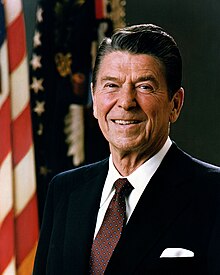| ||
|---|---|---|
Governor of California
40th President of the United States
Policies
Appointments
First term
Second term
Presidential campaigns
Post-presidency
Legacy
|
||
Ronald Wilson Reagan (/ˈreɪɡən/ RAY-gən; February 6, 1911 – June 5, 2004) was an American politician who served as the 40th president of the United States from 1981 to 1989 and became a highly influential voice of modern conservatism. Prior to his presidency, he was a Hollywood actor and union leader before serving as the 33rd governor of California from 1967 to 1975.
Reagan was raised in a low-income family in small towns of northern Illinois. He graduated from Eureka College in 1932 and worked as a radio sports commentator. After moving to California in 1937, he found work as an actor and starred in a few major productions. As president of the Screen Actors Guild, Reagan worked to root out alleged communist influence. In the 1950s, he moved into television and was a motivational speaker at General Electric factories. In 1964, his speech "A Time for Choosing" earned him national attention as a new conservative spokesman. Building a network of supporters, Reagan was elected governor of California in 1966. As governor, he raised taxes, turned a state budget deficit to a surplus, challenged the protesters at UC Berkeley, and ordered in National Guard troops during a period of protest movements.
In 1980, Reagan won the Republican presidential nomination and defeated the incumbent president, Jimmy Carter. At 69 years of age at the time of his first inauguration, Reagan was the oldest first-term U.S. president, a distinction he held until 2017 when Donald Trump was inaugurated at age 70. Reagan was re-elected in 1984, winning 58.8 percent of the national popular vote and losing only Washington, D.C. and his opponent Walter Mondale's home state of Minnesota, in one of the greatest landslide victories in American history.
Immediately on taking office as president, Reagan began implementing sweeping new political and economic initiatives. Reagan won over enough conservative Democrats to pass his program through Congress. Economic conditions had deteriorated under Carter, with slow growth and high inflation. Reagan promised that his supply-side economic policies, dubbed "Reaganomics", would turn around the economy with lower tax rates, economic deregulation, and reduction in government spending. Over his two terms, the economy saw a reduction of inflation from 12.5 percent to 4.4 percent and an average real GDP annual growth of 3.6 percent. His administration saw the longest period of economic growth in peacetime American history up to that point, lasting 92 months. Reagan enacted cuts in domestic discretionary spending, cut taxes, and increased military spending, which contributed to increased federal debt overall. In his first term, he survived an assassination attempt, continued the War on Drugs, and fought public sector labor unions.
In foreign affairs, he denounced communism and invaded the island country of Grenada after Communist elements took control; as a result a new government was appointed by the governor-general. With the economy booming again, foreign affair crises dominated his second term. Major concerns were the bombing of Libya, the Iran–Iraq War, the Iran–Contra affair, and the renewed Cold War. In June 1987, four years after he publicly described the Soviet Union as an "evil empire", Reagan challenged Soviet leader Mikhail Gorbachev to "tear down this wall!", during a speech at the Berlin Wall. He transitioned Cold War policy from détente to rollback by escalating an arms race with the USSR. He then engaged in talks with Gorbachev that culminated in the INF Treaty, which shrank both countries' nuclear arsenals.
When Reagan left office on January 20, 1989, he held an approval rating of 68 percent, matching those of Franklin D. Roosevelt and later Bill Clinton as the highest ratings for departing presidents in the 20th century. Although he had planned an active post-presidency, Reagan disclosed in November 1994 that he had been diagnosed with Alzheimer's disease earlier that year. Afterward, his informal public appearances became more infrequent as the disease progressed. He died at home on June 5, 2004. His tenure constituted a realignment toward conservative policies in the United States; he remains an icon among conservatives. Evaluations of his presidency among historians and the general public place him among the upper tier of U.S. presidents.
Last Updated: June 9, 2021


























